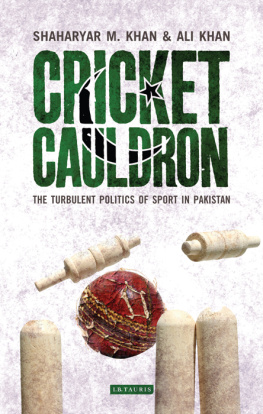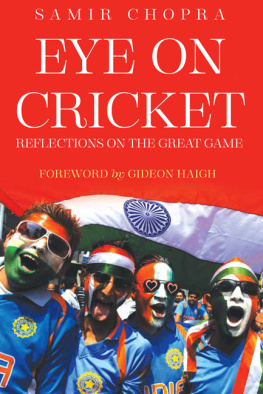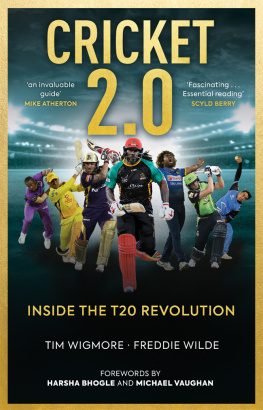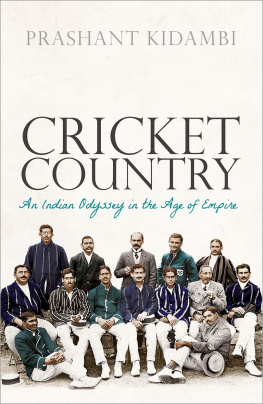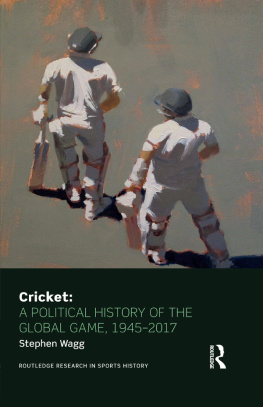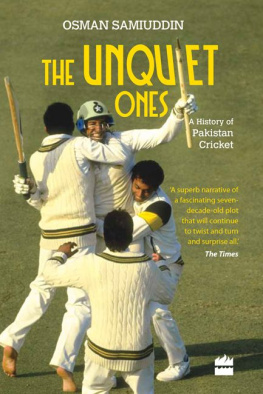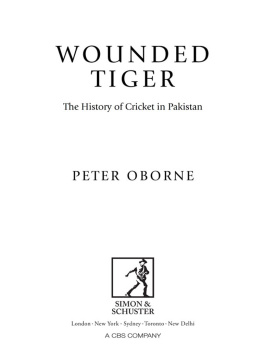
Shaharyar M. Khan is an eminent international diplomat who served as High Commissioner in the United Kingdom, Ambassador to France and Jordan, Pakistans Foreign Secretary and UN Secretary Generals Special Representative in Rwanda. His cricket pedigree is impeccable. He distinguished himself at Cambridge University, played club cricket in Britain and Pakistan and was a playing member of the MCC. His family link him to the all-time greats of cricket on the subcontinent including the Nawab of Pataudi, who played for England and captained India, and Mansur Ali Khan, a Blue and Indian captain. He was Chairman of the Pakistan Cricket Board, 20036. Shaharyar Khans previous publications include The Begums of Bhopal: A Dynasty of Women Rulers in the Raj, The Shallow Graves of Rwanda (both I.B.Tauris) and Memoirs of a Rebel Princess.
Ali Khan is Associate Professor of Anthropology and Department Chair at the Department of Humanities and Social Sciences at the Lahore University of Management Sciences (LUMS). His research interests vary from labour issues to popular culture in Pakistan focusing particularly on cinema and sports. He has previously worked in Washington and in Islamabad for the World Bank and with the International Labour Organisation primarily on projects related to child and bonded labour. He has an MPhil and a PhD in Social Anthropology from Cambridge University in England. He is the author of Representing Children: Power, Policy and the Discourse on Child Labour in the Football Manufacturing Industry of Pakistan (Oxford University Press, 2007). He is also the General Editor for a series of books on Sociology and Anthropology in Pakistan.
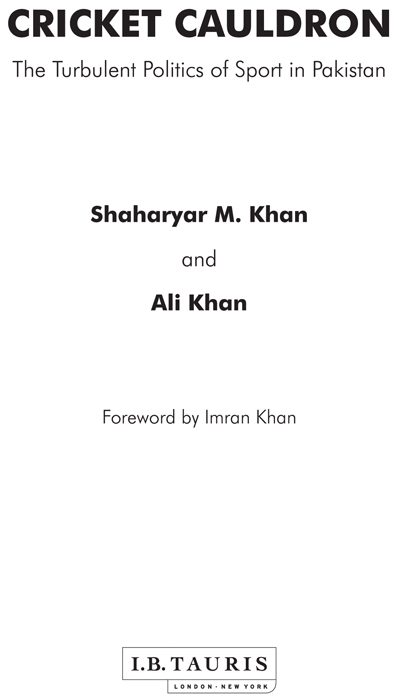
Published in 2013 by I.B.Tauris & Co Ltd
6 Salem Road, London W2 4BU
175 Fifth Avenue, New York NY 10010
www.ibtauris.com
Distributed in the United States and Canada
Exclusively by Palgrave Macmillan
175 Fifth Avenue, New York NY 10010
Copyright 2013 Shaharyar M. Khan and Ali Khan
The right of Shaharyar M. Khan and Ali Khan to be identified as the authors of this work has been asserted by the authors in accordance with the Copyright, Designs and Patents Act 1988.
All rights reserved. Except for brief quotations in a review, this book, or any part thereof, may not be reproduced, stored in or introduced into a retrieval system, or transmitted, in any form or by any means, electronic, mechanical, photocopying, recording or otherwise, without the prior written permission of the publisher.
ISBN: 978 1 78076 083 4
eISBN: 978 0 85773 317 7
A full CIP record for this book is available from the British Library
A full CIP record for this book is available from the Library of Congress
Library of Congress catalog card: available
Designed and typeset by 4word Ltd, Bristol
ILLUSTRATIONS
1936 Indian touring team to England. The two stalwarts of the Bombay Pentangular C. K. Nayudu, captain of the Hindus, and S. Wazir Ali, captain of the Muslims are seated second and first from the left. (Photo by Popperfoto/Getty Images) |
Cricket icons old and new meet in Lahore, 2004. Fazal Mahmud a year before his death with Sachin Tendulkar and Rahul Dravid during the PakistanIndia tour. (Photographer: Babri) |
Chacha Cricket and Indian fans in Lahore. (Photographer: Babri) |
Dina Wadia Mr Jinnahs daughter and her son watch the ODI in Lahore, seated with President Musharraf. It was the only occasion since Mr Jinnahs death in 1948 that his daughter and grandson visited Pakistan. (Photographer: Babri) |
Relaxed Indian fans enjoy the welcome of Pakistani crowds at the Lahore ODIs. (Photographer: Babri) |
Priyanka and Rahul Gandhi leave the VIP box and wade into the public stand to watch the Karachi ODI, 2004. They were given an enthusiastic reception by the crowd. Rajiv Shukla, current Vice-President of the BCCI and cabinet minister (right), joins them in the open. (Photographer: Babri) |
Bob Woolmer takes over as national coach, July 2004. (Photographer: Babri) |
The Peshawar regional womens team that participated in the first national womens championship in 2005. Fourth from left (seated) is Imtiaz Ahmed, cricketing icon, who was appointed adviser on womens cricket. Peshawar is one of the most conservative regions in Pakistan. (Photographer: Babri) |
Seated (rightleft): Thilanga Sumathipala (Sri Lanka), Bob Merriman (Australia), Malcolm Speed (CEO of the ICC), Tunku Imran (Malaysia), Ehsan Mani (chairman of the ICC), Percy Sonn (South Africa, vice-chairman of the ICC), Shaharyar M. Khan (Pakistan), Peter Chingoka (Zimbabwe), David Morgan (England and Wales). Back row (rightleft): Ray Mali (South Africa), three ICC senior officials, David Richards (Israel travelling on South African passport), Martin Snedden (CEO New Zealand), ICC senior official. Absent: Jagmohan Dalmiya (India), Teddy Griffith (West Indies). |
Aleem Dar (left) and Asad Rauf, two outstanding umpires on the ICC Elite Panel who have reversed Pakistans earlier poor reputation of umpiring. (Photo by Mark Kolbe/Getty Images) |
The three Pakistani cricketers caught spot-fixing in a sting operation left to right: Mohammad Amir, Salman Butt and Mohammad Asif. They were found guilty in a British criminal court and sentenced to prison. (Photo by Clive Rose/Getty Images) |
On-field camaraderie Inzamam and Anil Kumble walk back arm in arm at the close of play after a brief spat on the field Lahore Test, April 2004. (Photographer: Babri) |
President Bush asks Inzamam and Salman Butt: When can a team change the new ball? (Courtesy of the US Embassy, Pakistan) |
President Bush with students (boys and girls) of the Islamabad Model School after their net on the Embassy lawns. The US President batted and bowled with a tennis ball. The headmistress stands on the right. (Courtesy of the US Embassy, Pakistan) |
Darrell Hair and Billy Doctrove accuse Inzamam and the Pakistan team of having tampered with the ball, setting off the Oval crisis, 2006. (Photographer: Agency) |
Addressing the press after the Oval Test decision in which the Pakistan team were found not guilty of tampering with the ball, 2006. (Photographer: Babri) |
(left to right) Governor General Khalid Maqbool; Inzamam-ul-Haq; Dr Nasim Ashraf, then Chairman of the PCB; Shaharyar M. Khan, former Chairman of the PCB; and Talet Ali, Team Manager, attend Bob Woolmers memorial service at the Anglican Cathedral Church of Resurrection, Lahore. Shoaib Malik and Mohammad Asif can be glimpsed in the background. (Photographer: Babri) |
FOREWORD
When I heard the verdict of the spot-fixing case against the three Pakistani cricketers Salman Butt, Mohammad Asif and Mohammad Amir I felt an intense sadness. A sadness borne of the realization that what had occurred particularly in the case of the 19-year-old Amir was an enormous waste of exceptional talent. Three careers had been cut short because corruption and dishonesty had eaten into the soul of Pakistan cricket. But as pointed out in this book, can we blame the three transgressors? Have they failed Pakistan? Or has Pakistan collectively failed them? What ails Pakistan cricket in specific terms ails Pakistan generally and across the board. Lack of accountability, corruption, dishonesty, a broken education system these are the issues that Pakistan as a nation faces.
Next page
